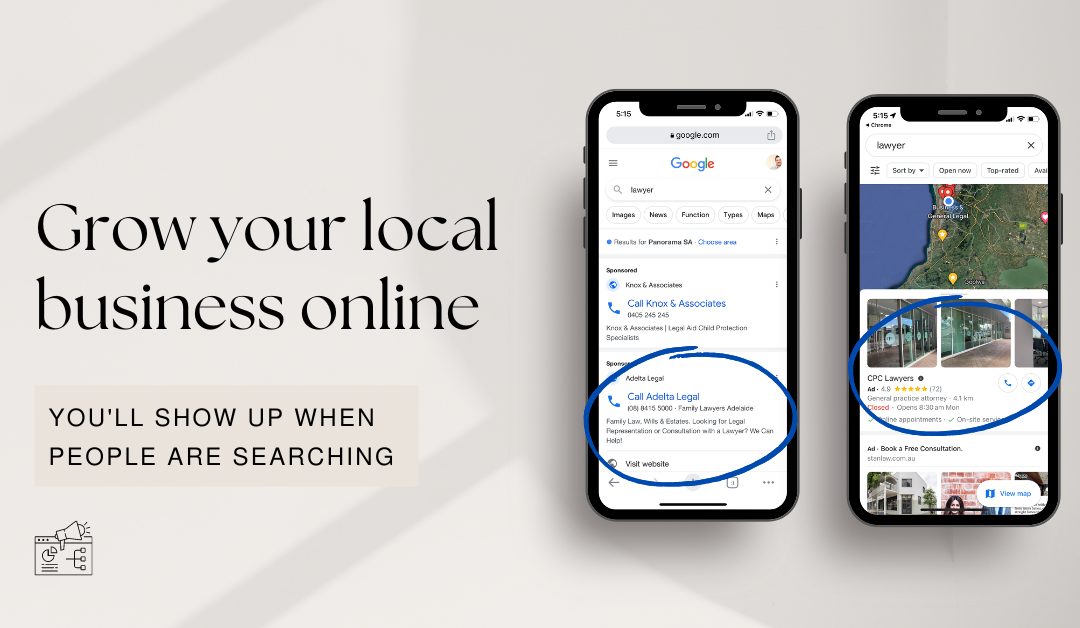Three ways to grow your local business online
If you think your website can deliver more than what it currently is, you’re right. Make sure your business is showing up when your customers are searching for you.
This can be achieved with some simple website hygiene.
The other two ways to grow online are directly correlated to the delivery of your service. If you do a fantastic job, then you can accelerate your growth by simply asking two things: a review and a referral.
These aren’t a quick fix, but they will work. Do you have the discipline to follow through?
Show up when your customers are searching for you with Local Search Engine Optimisation
Local SEO (Search Engine Optimization) is the process of optimizing a business’s online presence to improve its visibility and ranking in local search results. For service businesses that operate in a specific area, local SEO is crucial to reach potential customers in their local market. Here are the 5 building blocks of local SEO for service businesses:
- Google My Business (GMB): This is a free tool from Google that enables businesses to manage their online presence across Google, including Google Maps and Google Search. A service business should claim and optimize their GMB listing by providing accurate and complete information, such as business name, address, phone number, website, hours of operation, and services offered. Also, encourage customers to leave reviews and respond to them promptly.
- Local keyword research: Service businesses should identify relevant local keywords that potential customers use to search for their services, such as “plumber in New York” or “carpet cleaning in Chicago.” Then, optimize their website and GMB listing with those keywords to improve their ranking in local search results.
- On-page optimization: Service businesses should ensure that their website is optimized for local SEO by including relevant local keywords in their meta titles, descriptions, headings, and content. Also, create location-specific pages, such as “services in Chicago” or “service areas,” to target local customers.
- NAP consistency: NAP (Name, Address, and Phone number) consistency is critical for local SEO. Service businesses should ensure that their NAP information is consistent across all online directories, including their website, GMB listing, social media profiles, and other online directories. Inconsistencies can confuse search engines and customers and affect their ranking in local search results.
- Local link building: Service businesses should build high-quality local backlinks from reputable websites, such as local business directories, industry associations, or local publications. Local link building can improve their website’s authority and reputation in the local market, which can positively affect their ranking in local search results.
Show up when your customers are searching for you with Local Search Engine Optimisation
Local SEO (Search Engine Optimization) is the process of optimizing a business’s online presence to improve its visibility and ranking in local search results. For service businesses that operate in a specific area, local SEO is crucial to reach potential customers in their local market. Here are the 5 building blocks of local SEO for service businesses:
- Google My Business (GMB): This is a free tool from Google that enables businesses to manage their online presence across Google, including Google Maps and Google Search. A service business should claim and optimize their GMB listing by providing accurate and complete information, such as business name, address, phone number, website, hours of operation, and services offered. Also, encourage customers to leave reviews and respond to them promptly.
- Local keyword research: Service businesses should identify relevant local keywords that potential customers use to search for their services, such as “plumber in New York” or “carpet cleaning in Chicago.” Then, optimize their website and GMB listing with those keywords to improve their ranking in local search results.
- On-page optimization: Service businesses should ensure that their website is optimized for local SEO by including relevant local keywords in their meta titles, descriptions, headings, and content. Also, create location-specific pages, such as “services in Chicago” or “service areas,” to target local customers.
- NAP consistency: NAP (Name, Address, and Phone number) consistency is critical for local SEO. Service businesses should ensure that their NAP information is consistent across all online directories, including their website, GMB listing, social media profiles, and other online directories. Inconsistencies can confuse search engines and customers and affect their ranking in local search results.
- Local link building: Service businesses should build high-quality local backlinks from reputable websites, such as local business directories, industry associations, or local publications. Local link building can improve their website’s authority and reputation in the local market, which can positively affect their ranking in local search results.
Grow with Reviews from Happy Customers
Here are three recommendations to get reviews from customers:
- Ask for reviews: The simplest way to get reviews from customers is to ask them directly. After completing a service or making a purchase, service businesses can ask their customers to leave a review on their GMB listing or website. It’s essential to make the request politely and provide clear instructions on how to leave a review.
- Make it easy: Service businesses can make it easy for customers to leave reviews by providing direct links to their GMB listing or review page on their website. They can also include review instructions in their email signature, receipts, or follow-up emails. The easier it is for customers to leave a review, the more likely they are to do so.
- Offer incentives: While it’s against Google’s policy to offer incentives in exchange for reviews, service businesses can still incentivize their customers to leave a review by offering a chance to win a prize or discount on their next service. However, it’s essential to make the incentive clear that it’s not tied to leaving a positive review but merely an appreciation for the customer’s time and effort.
Grow with Referrals
Here are five strategies to ask for referrals:
- Offer exceptional service: The best way to get referrals is by providing exceptional service to your customers. When customers are satisfied with your service, they are more likely to recommend you to their friends and family. Ensure that you deliver high-quality services and go above and beyond to exceed your customers’ expectations.
- Ask at the right time: The best time to ask for a referral is when your customer is happy and satisfied with your service. This can be after completing a service or when they give positive feedback about your business. Timing is crucial when asking for referrals as it can affect how likely a customer is to refer you.
- Provide incentives: Incentives can motivate customers to refer your business to others. You can offer a discount, a free service, or a gift card to customers who refer new clients to your business. Make sure the incentive is valuable enough to encourage your customers to refer you, but not too much that it looks like you’re trying to buy referrals.
- Create a referral program: A referral program is a structured way of asking for referrals. You can create a program that rewards both the referrer and the referred customer. For example, you can offer a discount to the referrer and the referred customer. Make sure the program is easy to understand and communicate it to your customers.
- Use social media and email marketing: Social media and email marketing are effective ways to ask for referrals. You can create social media posts and email campaigns that encourage your customers to refer you to their network. Provide clear instructions on how to refer and what the incentive is. Also, make it easy for your customers to share your social media posts or email campaigns with their friends and family.
Summarising Three Ways to Grow Your Local Business
For service businesses looking to boost their online visibility, Local SEO can be a game-changer. By optimizing their online presence for local search, service businesses can attract more local customers and increase their revenue. In this context, we discussed the five building blocks of Local SEO for service businesses: keyword research, GMB optimization, online reviews, content creation, and link building. Additionally, we explored three effective strategies for getting reviews from customers, such as asking for reviews, making it easy, and offering incentives. Finally, we discussed five strategies for asking for referrals, including providing exceptional service, asking at the right time, providing incentives, creating a referral program, and using social media and email marketing.
By implementing these strategies, service businesses can improve their online visibility, attract more customers, and grow their business.
Are you ready to grow?
Start by finding out where you’re at right now with a free online business report.




